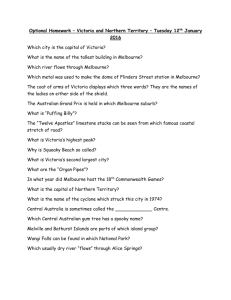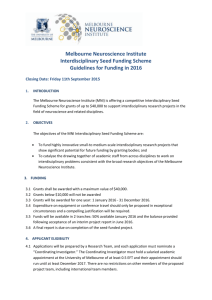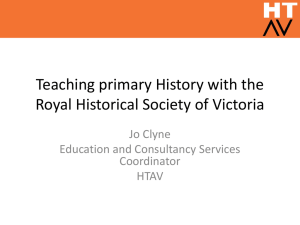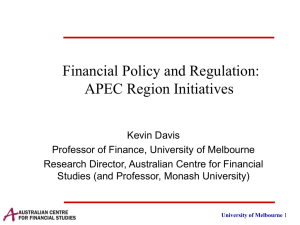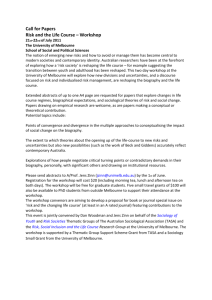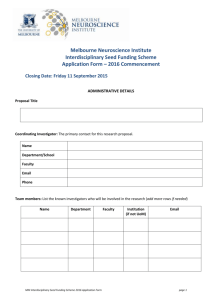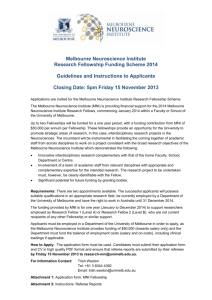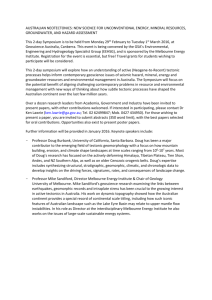Guidelines - Melbourne Neuroscience Institute
advertisement
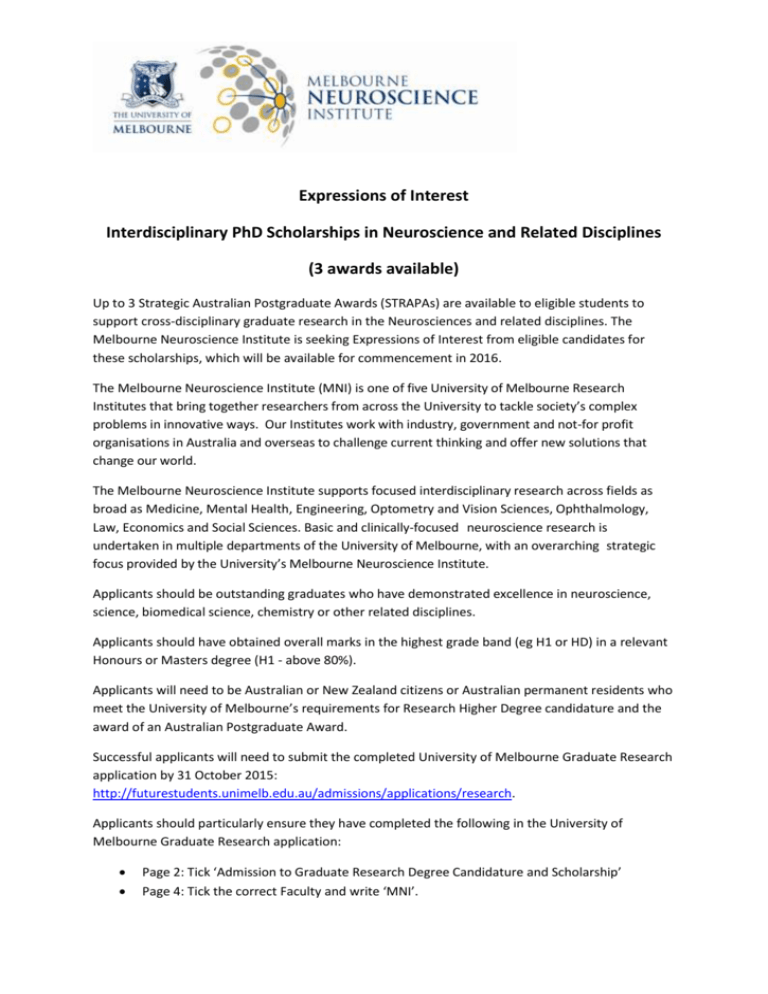
Expressions of Interest
Interdisciplinary PhD Scholarships in Neuroscience and Related Disciplines
(3 awards available)
Up to 3 Strategic Australian Postgraduate Awards (STRAPAs) are available to eligible students to
support cross-disciplinary graduate research in the Neurosciences and related disciplines. The
Melbourne Neuroscience Institute is seeking Expressions of Interest from eligible candidates for
these scholarships, which will be available for commencement in 2016.
The Melbourne Neuroscience Institute (MNI) is one of five University of Melbourne Research
Institutes that bring together researchers from across the University to tackle society’s complex
problems in innovative ways. Our Institutes work with industry, government and not-for profit
organisations in Australia and overseas to challenge current thinking and offer new solutions that
change our world.
The Melbourne Neuroscience Institute supports focused interdisciplinary research across fields as
broad as Medicine, Mental Health, Engineering, Optometry and Vision Sciences, Ophthalmology,
Law, Economics and Social Sciences. Basic and clinically-focused neuroscience research is
undertaken in multiple departments of the University of Melbourne, with an overarching strategic
focus provided by the University’s Melbourne Neuroscience Institute.
Applicants should be outstanding graduates who have demonstrated excellence in neuroscience,
science, biomedical science, chemistry or other related disciplines.
Applicants should have obtained overall marks in the highest grade band (eg H1 or HD) in a relevant
Honours or Masters degree (H1 - above 80%).
Applicants will need to be Australian or New Zealand citizens or Australian permanent residents who
meet the University of Melbourne’s requirements for Research Higher Degree candidature and the
award of an Australian Postgraduate Award.
Successful applicants will need to submit the completed University of Melbourne Graduate Research
application by 31 October 2015:
http://futurestudents.unimelb.edu.au/admissions/applications/research.
Applicants should particularly ensure they have completed the following in the University of
Melbourne Graduate Research application:
Page 2: Tick ‘Admission to Graduate Research Degree Candidature and Scholarship’
Page 4: Tick the correct Faculty and write ‘MNI’.
o
For the Faculty of Medicine, Dentistry and Health Sciences: Write the name of the
department or school (check with MNI if in doubt).
Page 9: Tick ‘Australian Postgraduate Awards’ (and write ‘STRAPA’ and any other
scholarships for which you wish to be considered).
Important:
Assessment timeframe (completed applications): within 8 weeks of receipt.
Notice of outcome will be sent by email.
Formal advice regarding the STRAPA outcome may be timed and issued with the course
offer; informal advice may be provided by MNI prior.
STRAPA recipients will need to commence their candidature by the start of February 2016
or the scholarship may be withdrawn.
Melbourne Neuroscience Institute STRAPA recipients will receive an additional support package for
their research of $5,000 per annum from the MNI for 3 years. These funds will be allocated as
follows:
$3,000 per annum stipend top-up
$2,000 per annum to be held by the supervising laboratory and used for direct research
costs for the student’s project and attendance at conferences.
Prospective applicants should discuss potential projects with research supervisors at the University
of Melbourne across multidisciplinary areas in the Neurosciences and related disciplines. To be
eligible, the PhD project must utilize a multidisciplinary approach as evidenced (in most cases) by the
formal involvement of two PhD supervisors.
You can identify potential supervisors in two ways:
•Through the Faculty or Graduate School that best meets your research interest
•Through the Find an expert website (not all researchers listed are available for supervision)
Research areas for Interdisciplinary PhD projects include:
1.
Translational and clinical neuroscience/psychiatry: Focus on early detection, prevention and
pathogenesis. Key areas of research include:
Epilepsy
Alzheimer’s Disease/Dementia
Stroke
Multiple Sclerosis
Brain tumours
Psychosis (including youth mental health)
Posttraumatic mental health
HIV and cognitive impairment
2.
Sensory and Integrative Neurosciences/biomedical engineering:
Hearing (including cochlear implant oriented research)
Vision
Autonomic and sensory neuroscience
Homeostasis
3.
Molecular and cellular neuroscience - encompassing both fundamental research and its
application to neurological disease:
Neural stem cells and neuro/gliogenesis
Neural connectivity in development and regeneration
Neural cell migration
Neurophysiology and neuropharmacology
Neural plasticity
4.
Psychological sciences:
Cognitive psychology of attention, visual cognition, decision making, and executive
functions
Social psychology of intergroup, cultural, and social network processes
Clinical and health psychology and psychotic and personality disorders.
5.
Other research areas:
Neurogenetics/Pharmacogenomics/Precision Medicine
Prediction of neurodegenerative disease
Psychological research on broader societal issues with policy implications
Traumatic Brain Injury
STRAPA Application Process
All Expressions of Interest must be submitted using the EoI Form.
The completed form together with your CV, certified copies of academic transcripts and the contact
details of two academic referees is to be emailed as a single file (pdf), named in this format:
{Applicant’s SURNAME}-MNI STRAPA 2016 to: research-mni@unimelb.edu.au , no later than 5pm,
Friday 25 September 2015.
For enquiries, please contact Vikki Marshall, MNI Operations Manager via the above email address
or telephone: 834 48692.
For further information about the Melbourne Neuroscience Institute:
http://www.neuroscience.unimelb.edu.au/
Information on undertaking a research higher degree at the University of Melbourne can be found
at: http://futurestudents.unimelb.edu.au/info/research
For information about different faculties, refer to:
http://futurestudents.unimelb.edu.au/info/research#contacts
